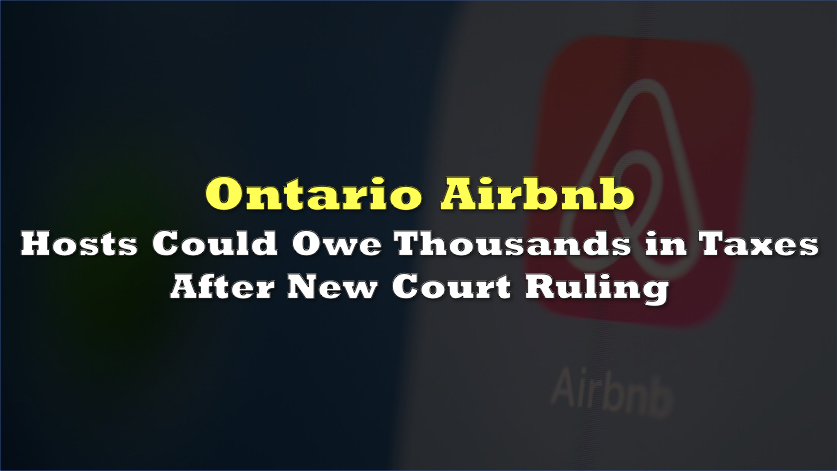Airbnb (NASDAQ: ABNB) hosts in Ontario were hit with a tax bombshell recently, as a ruling from the Tax Court of Canada established that property owners who consistently rent out their homes on short-term platforms like Airbnb could face hefty tax liabilities when selling their property.
In a ruling that could have widespread repercussions for short-term rental operators, the Tax Court of Canada clarified that properties used consistently for short-term rentals are subject to a 13% Harmonized Sales Tax (HST) when sold. Traditionally, the sale of a residential property in Canada is exempt from HST, but the court ruled that homes rented on platforms like Airbnb are classified as “commercial properties,” subjecting them to the tax.
The case that set the precedent involved an Ottawa condo owner who had initially rented out his unit on long-term leases but switched to short-term rentals via Airbnb for 14 months before selling the property in 2018. The owner did not pay HST at the time of sale, assuming the sale would fall under the exemption for residential properties.
However, the Canada Revenue Agency (CRA) later assessed the sale and determined that the property, due to its consistent use as a short-term rental, was no longer considered a residential complex but a commercial one.
Legal and Financial Implications
“People must be absolutely careful if they want to use short-term rental platforms for their property consistently. They’ll be taxed a big amount. If they sell their unit for $1 million, they have to pay $130,000 in tax,” John Zinati, a real estate lawyer based in Toronto, explained.
This decision applies to all property types—condominiums, townhomes, and single-family homes alike—that have been consistently rented on short-term rental platforms like Airbnb and VRBO. The ruling may come as a shock to many homeowners who are unfamiliar with how short-term rentals can alter the tax implications when they sell their homes.
Ron Butler, a well-known mortgage expert, voiced his concerns on social media, suggesting that this ruling could mark the end of Airbnb’s golden age in Canada: “Who would risk exposure to $40K, $60K, $100K of tax on the sale of a condo?”
He also noted that while Airbnb was once a lucrative business for homeowners renting out properties, the combination of tax liabilities and increasing regulations might drive people away from the platform altogether.
“Airbnb without the owner living in the property started to be banned… Not just in Canada but all over the world,” he added, highlighting the global trend of cities cracking down on unregulated short-term rentals.
The END of Airbnb? Who Is Going To Risk Paying HST On The Sale Of The Property?
— Ron Butler (@ronmortgageguy) October 25, 2024
Things have been going very badly for Airbnb for several years but could this be a stake through the heart of the whole thing
Would anyone risk having to pay HST to sell a resale Condo?
Nope
2/
Commercial vs. Residential Use
At the heart of this issue is how the CRA classifies a property as residential or commercial. The court’s ruling clarified that when a property is leased out consistently for short-term stays—similar to how a hotel operates—the CRA deems it a commercial property. This shift in classification removes the HST exemption typically available for residential sales, and the full value of the sale becomes taxable.
Zinati noted that homeowners who rent their properties sporadically or for longer periods may not face the same tax liability.
“If you rent out your property for a weekend every now and then, you’re not subject to this tax rule… It has to be on a consistent basis, and in this case, the homeowner did so for 14 months, which counted,” he elucidated.
The court ruling doesn’t represent a change in the law, but it has opened many homeowners’ eyes to the risk they face if they enter the short-term rental market without fully understanding the tax implications. Dale Barrett, founder of Barrett Tax Law, pointed out that many Canadians are simply unaware of how the Excise Tax Act applies to real estate transactions, saying “this decision is educating people about the law.”
“People are in the dark about HST and don’t understand how the Excise Tax works and how it applies to properties,” he added.
Tax experts recommend that homeowners who use or are considering using their properties for short-term rentals seek legal and financial advice to understand their liabilities.
Homeowners who continue to list properties on short-term rental platforms should also be aware of the 90% threshold that determines whether the property will be subject to HST. If the property is rented out for short-term use more than 90% of the time, it may lose its residential tax exemption upon sale. However, the specifics of how to calculate this threshold remain somewhat murky, and further court cases may be needed to clarify the rule.
Airbnb hosts are already facing a challenging market, with increasing regulations from municipalities and rising operational costs. Toronto, for example, has imposed strict rules limiting short-term rentals to primary residences, aiming to curb the growing concern that short-term rentals are exacerbating the city’s housing crisis. Hosts must register their properties and follow city guidelines, or they face steep fines.
While Airbnb remains popular in major cities and tourist destinations, the economic model is under increasing strain. Hosts who once saw short-term rentals as a way to capitalize on high-demand areas are now grappling with regulations, taxes, and an uncertain future.
Information for this story was found via Toronto Star and the sources and companies mentioned. The author has no securities or affiliations related to the organizations discussed. Not a recommendation to buy or sell. Always do additional research and consult a professional before purchasing a security. The author holds no licenses.






